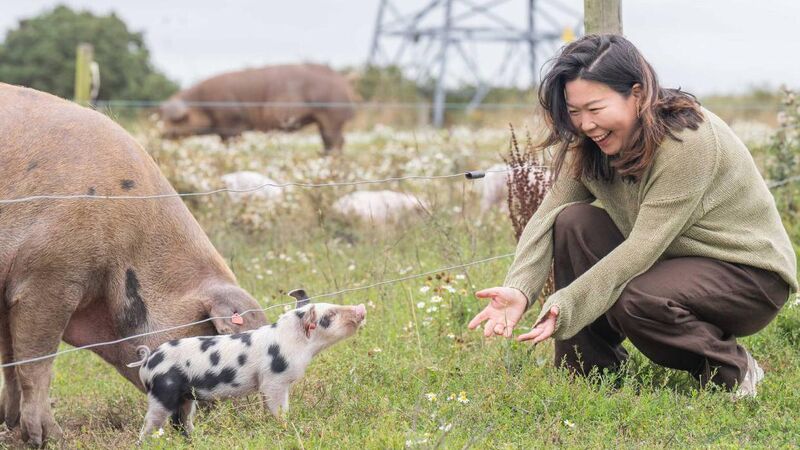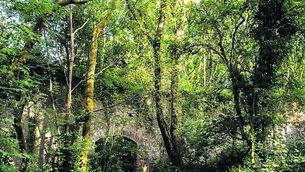Kathriona Devereux: A Cork city farm that’s driving a revolution in how we eat

Home to free-range pigs and Cork Rooftop Farm’s expanded acreage, it’s become a hub for people thinking seriously about how to feed Cork from the fields that surround our city.
I was there last week for a panel discussion on building robust food systems for the modern age. The business-as-usual approach of large farms growing food and transporting it vast distances to supermarkets isn’t going to hack it in our climate-disrupted era.
The guest speaker, Canadian market gardener Jean-Martin Fortier, was in town to spread the word that small can be beautiful when it comes to feeding a community.
Ireland sells itself as a ‘food island’, yet much of what we eat is imported. More than 80% of the fruit and vegetables we consume comes from overseas. Most of our onions, carrots, and broccoli are grown abroad - crops that could thrive in Irish soil.
Fortier’s message is timely. The model of a network of market gardeners or community-supported agriculture (CSA) connects farmers and consumers directly, with customers subscribing to a farm’s harvest for the season.
CSAs cut out the middlemen of wholesalers and supermarkets. Shoppers get local, fresh, usually organic food; farmers get steady income and connection to their community. It’s one approach of how we might think about reshaping food independence in Cork.
As I drove away from the event in the wind and rain of Storm Amy, I thought if we’re serious about sustainable food systems, we must remember the very first one - breastfeeding. As National Breastfeeding Week ends today, it’s worth remembering that breastfeeding is the foundation stone of food sovereignty.
It’s a sustainability ‘solution’ that provides optimum nutrition and immunological protection for babies, cuts carbon emissions, reduces waste, boosts public health, and strengthens healthcare systems and economies.
Globally, optimal breastfeeding could prevent 823,000 child deaths and 20,000 maternal deaths from breast cancer every year. Yet this most natural and sustainable food source has been systematically displaced by an industry built on profit.
Since the invention of infant formula in the 1860s, global corporations have turned feeding babies into objects of commerce and trade.
The World Health Organisation (WHO) recommends exclusive breastfeeding for the first six months, and continued breastfeeding to age two or beyond, yet worldwide, only 48% of babies under six months are exclusively breastfed.
In Ireland, the figures are starker: just 63% of babies receive breast milk at birth, and fewer than 5% are breastfed at six months.
Globally, inadequate breastfeeding costs an estimated US$341 billion each year in lost productivity and preventable healthcare expenses.
Nobody is suggesting ending formula production, it is vital for those who can’t or choose not to breastfeed, but babies who aren’t breastfed only need infant formula up to 12 months and can then switch to cow’s milk.
Many products on the market like ‘follow-on’ or ‘toddler’ milks are simply unnecessary. These products exist largely to drive consumption.
The formula industry, worth $55 billion annually, spends around $5 billion a year on marketing to sustain demand.
Formula production also comes with enormous environmental costs.
The WHO says producing one kilo of formula generates up to 14 kilos of greenhouse gas emissions and consumes more than 5,000 litres of water.
Achieving global breastfeeding targets would cut far more emissions than decarbonising the formula industry itself.
So, clearly, beyond its health benefits, breastfeeding is a climate- resilience strategy hiding in plain sight. Yet governments still enable the industry’s expansion.
At the same time, governments pledge to reduce obesity, improve water quality, cut carbon emissions, and promote breastfeeding. The contradiction is disorientating.
We, the taxpayers, fund the very systems that undermine public health and climate goals.
Countries that take breastfeeding seriously show what’s possible.
Extended paid parental leave, the Baby-Friendly Hospital Initiative, accessible community support, and strict bans on formula marketing consistently yield higher breastfeeding rates.
These measures are not about individual willpower; they recognise that how we feed infants is shaped by policy, culture, and economics as much as by personal choice.
Improving breastfeeding rates isn’t simply a maternal health issue - it’s a public good. It strengthens food security, reduces pressure on health services, and lowers emissions.
As I drove away from the discussion event, I thought about how farmers like Peter Twomey in Glenbrook Farm or Brian McCarthy at Cork Rooftop Farm are part of a quiet revolution already under way - people determined to feed their communities with locally grown food that nourishes.
The infant-feeding advocates who fight for mothers and babies around the world are part of that same movement - trying to place people and their health and nutrition at the centre of our food system rather than shareholders’ interests.
The polytunnels of Ballyvolane and the maternity wards of Bishopstown are worlds apart on one level, but are part of the same story. Each is about people trying to reclaim how we feed one another - whether it’s vegetables for our tables or milk for our babies.







 App?
App?




